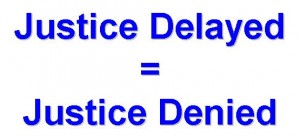GOI should UNCLOG the judicial system by withdrawing 90%(Which the PM has pointed out in the article below) of its cases where it is a petitioner and compromise where it is a respondent.
Have timelines for all types of crimes and cases
Create and Appoint many more judges posts -Will give additional employment and make Indians more law abiding.
I know there are many more things to be done to make the judicial system, effective, speedy and responsive, but let us, at least make a beginning.
Forget Right to Justice; Just Do What is Right4 July 2011 92 views 2 Comments ..or how Justice delayed is justice denied. Some of you must have read the recent news-report of a bill proposed to be tabled in Parliament to ensure “time-bound justice for citizens“. The bill has some interesting provisions, including
Press reports mention that the This should be cause for celebration, I guess…Or should it? Is the solution to too many laws and a clogged up judicial system, another law (or another “Right”)? As Joginder Singh writes in “Gift-wrapped bunkum“
Our policy-makers (and well-minded civic activists) often confuse symptoms with causes..and this bill is a great illustration of that. Instead of remedies to fix a broken system, what we get is another law that mandates a 3-year deadline for disposal of cases. One doesn’t need to be a genius to figure out what happens if the time-frame is exceeded. The over-burdened system gets further swamped with even more cases… The problem is actually quite simple: We have too many laws and the Government is the biggest litigant. Another law (or “right”) will almost certainly make the situation worse. As Joginder Singh writes:
The problem of too many laws and a over-zealous government is compounded by the acute manpower scarcity. As Joginder Singh points out in his article, UP – with a population of 200 million – has only 65 sitting judges (95 of the sanctioned 160 posts are vacant)! Not surprisingly, its number of pending cases in the state is approaching 10 Lakhs. Depressingly, 30% of criminal trials have been pending for 10 years, of which 9 % for more than 20 years. More depressingly, the Supreme Court itself is not hopeful about speedy justice. As a 2-judge bench observed recently: The backlog is pervasive. For example, a recent report of the Second Administrative Reforms Commission (SARC) titled, “Ethics in Governance” noted:
This even as Sections 86(6) and 86(7) of the Representation of Peoples Act, 1951 say that “the High Court shall endeavour to dispose of an election petition within six months and also as far as practicably possible conduct proceedings on a day-to-day basis”. Given this situation, shouldn’t the focus and emphasis be more on “fewer laws and better implementation?” As Tavleen Singh writes:
The government would do right to focus on that. instead of bringing in another law disguised as a “right”. We dont need more laws. We need a better justice system. We need faster implementation. We need accountability. More laws will not solve our woes; they will add to them |


No comments:
Post a Comment